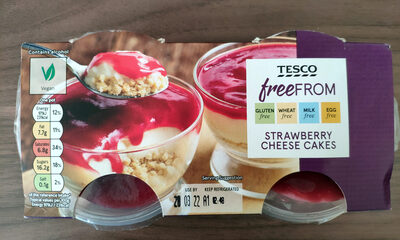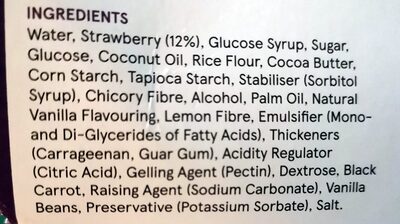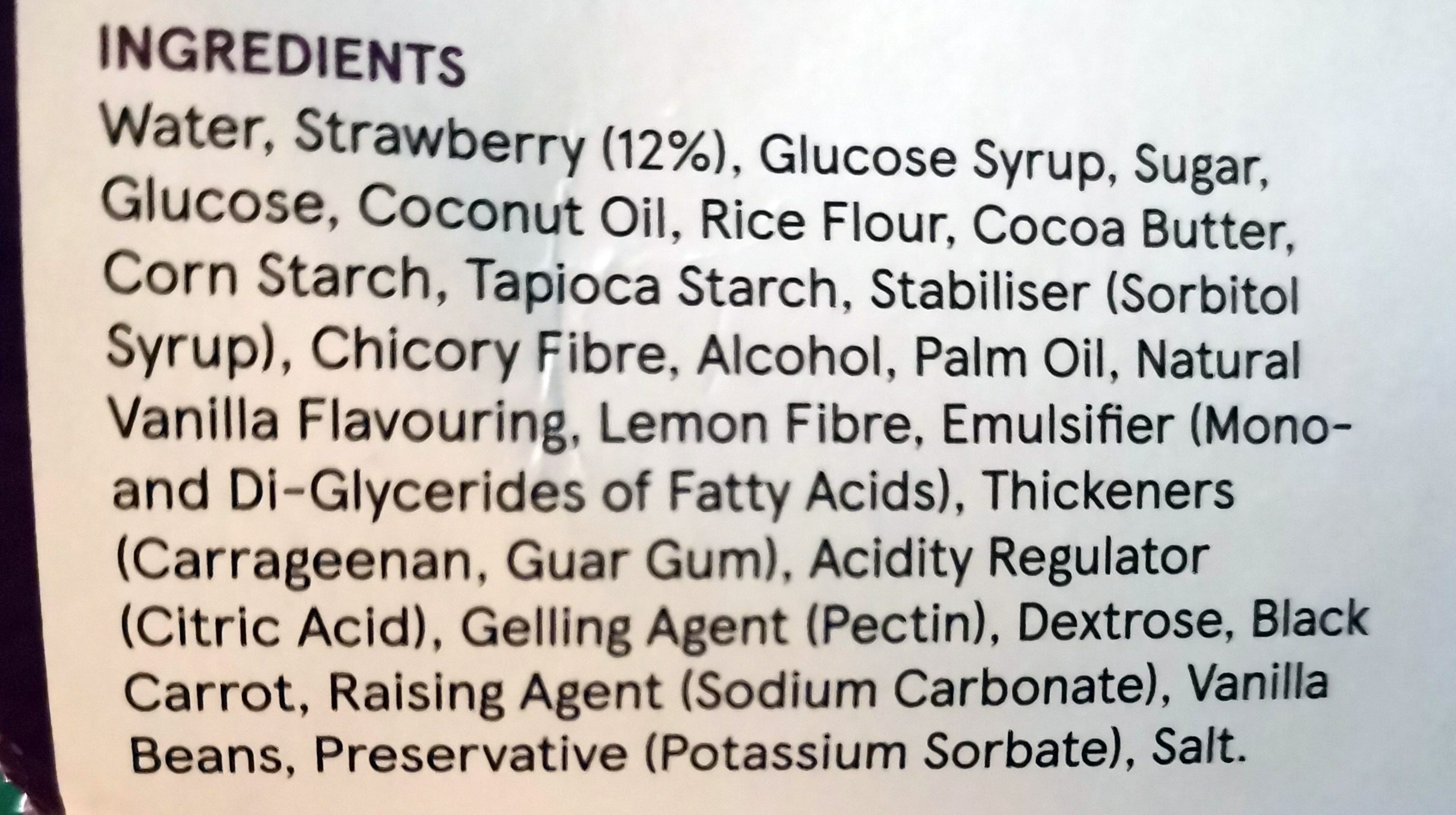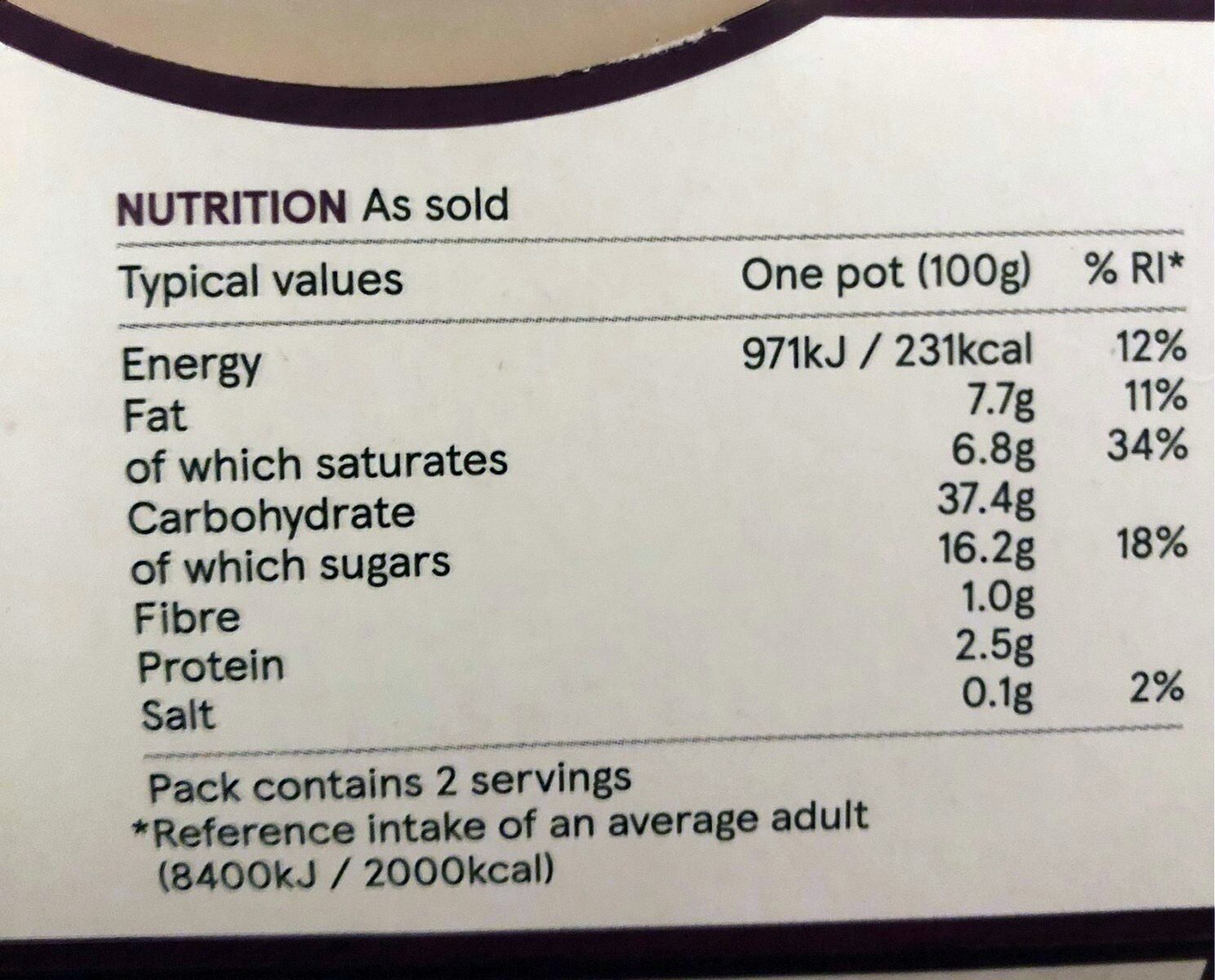Help us make food transparency the norm!
As a non-profit organization, we depend on your donations to continue informing consumers around the world about what they eat.
The food revolution starts with you!
Strawberry Cheese Cakes - Tesco - 200g
Strawberry Cheese Cakes - Tesco - 200g
This product page is not complete. You can help to complete it by editing it and adding more data from the photos we have, or by taking more photos using the app for Android or iPhone/iPad. Thank you!
×
Barcode: 5057753905224 (EAN / EAN-13)
Common name: Cheese cake with a biscuit base with a strawberry compote
Quantity: 200g
Brands: Tesco
Categories: Snacks, Desserts, Sweet snacks, Biscuits and cakes, Cakes, Cheesecakes, Cheesecakes with fruits, Strawberry cheesecakes
Labels, certifications, awards: No gluten, Vegetarian, Vegan, Contains alcohol, Do not freeze, No eggs, No milk, No wheat
Traceability code: IT 03-258 CE
Stores: Tesco
Countries where sold: United Kingdom
Matching with your preferences
Health
Ingredients
-
34 ingredients
Water, Strawberry 12%, Glucose Syrup, Sugar, Glucose, Coconut Oil, Rice Flour, Cocoa Butter, Corn Starch, Tapioca Starch, Stabiliser (Sorbitol Syrup), Chicory Fibre, Alcohol, Palm Oil, Natural Vanilla Flavouring, Lemon Fibre, Emulsifier (Mono - and Di-Glycerides of Fatty Acids), Thickeners (Carrageenan, Guar Gum), Acidity Regulator (Citric Acid), Gelling Agent (Pectin), Dextrose, Black Carrot, Raising Agent (Sodium Carbonate), Vanilla Beans, Preservative (Potassium Sorbate), Salt.
Food processing
-
Ultra processed foods
Elements that indicate the product is in the 4 - Ultra processed food and drink products group:
- Additive: E407 - Carrageenan
- Additive: E412 - Guar gum
- Additive: E420 - Sorbitol
- Additive: E440 - Pectins
- Additive: E471 - Mono- and diglycerides of fatty acids
- Ingredient: Dextrose
- Ingredient: Emulsifier
- Ingredient: Flavouring
- Ingredient: Gelling agent
- Ingredient: Glucose
- Ingredient: Glucose syrup
- Ingredient: Thickener
Food products are classified into 4 groups according to their degree of processing:
- Unprocessed or minimally processed foods
- Processed culinary ingredients
- Processed foods
- Ultra processed foods
The determination of the group is based on the category of the product and on the ingredients it contains.
Additives
-
E202 - Potassium sorbate
Potassium sorbate (E202) is a synthetic food preservative commonly used to extend the shelf life of various food products.
It works by inhibiting the growth of molds, yeast, and some bacteria, preventing spoilage. When added to foods, it helps maintain their freshness and quality.
Some studies have shown that when combined with nitrites, potassium sorbate have genotoxic activity in vitro. However, potassium sorbate is generally recognized as safe (GRAS) by regulatory authorities.
-
E330 - Citric acid
Citric acid is a natural organic acid found in citrus fruits such as lemons, oranges, and limes.
It is widely used in the food industry as a flavor enhancer, acidulant, and preservative due to its tart and refreshing taste.
Citric acid is safe for consumption when used in moderation and is considered a generally recognized as safe (GRAS) food additive by regulatory agencies worldwide.
-
E407 - Carrageenan
Carrageenan (E407), derived from red seaweed, is widely employed in the food industry as a gelling, thickening, and stabilizing agent, notably in dairy and meat products.
It can exist in various forms, each imparting distinct textural properties to food.
However, its degraded form, often referred to as poligeenan, has raised health concerns due to its potential inflammatory effects and its classification as a possible human carcinogen (Group 2B) by the International Agency for Research on Cancer (IARC).
Nevertheless, food-grade carrageenan has been deemed safe by various regulatory bodies when consumed in amounts typically found in food.
-
E412 - Guar gum
Guar gum (E412) is a natural food additive derived from guar beans.
This white, odorless powder is valued for its remarkable thickening and stabilizing properties, making it a common ingredient in various food products, including sauces, dressings, and ice creams.
When used in moderation, guar gum is considered safe for consumption, with no known adverse health effects.
-
E420 - Sorbitol
Sorbitol: Sorbitol --, less commonly known as glucitol --, is a sugar alcohol with a sweet taste which the human body metabolizes slowly. It can be obtained by reduction of glucose, which changes the aldehyde group to a hydroxyl group. Most sorbitol is made from corn syrup, but it is also found in nature, for example in apples, pears, peaches, and prunes. It is converted to fructose by sorbitol-6-phosphate 2-dehydrogenase. Sorbitol is an isomer of mannitol, another sugar alcohol; the two differ only in the orientation of the hydroxyl group on carbon 2. While similar, the two sugar alcohols have very different sources in nature, melting points, and uses.Source: Wikipedia
-
E420ii - Sorbitol syrup
Sorbitol: Sorbitol --, less commonly known as glucitol --, is a sugar alcohol with a sweet taste which the human body metabolizes slowly. It can be obtained by reduction of glucose, which changes the aldehyde group to a hydroxyl group. Most sorbitol is made from corn syrup, but it is also found in nature, for example in apples, pears, peaches, and prunes. It is converted to fructose by sorbitol-6-phosphate 2-dehydrogenase. Sorbitol is an isomer of mannitol, another sugar alcohol; the two differ only in the orientation of the hydroxyl group on carbon 2. While similar, the two sugar alcohols have very different sources in nature, melting points, and uses.Source: Wikipedia
-
E440 - Pectins
Pectins (E440) are natural carbohydrates, predominantly found in fruits, that act as gelling agents in the food industry, creating the desirable jelly-like texture in jams, jellies, and marmalades.
Pectins stabilize and thicken various food products, such as desserts, confectioneries, and beverages, ensuring a uniform consistency and quality.
Recognized as safe by various health authorities, pectins have been widely used without notable adverse effects when consumed in typical dietary amounts.
-
E471 - Mono- and diglycerides of fatty acids
Mono- and diglycerides of fatty acids (E471), are food additives commonly used as emulsifiers in various processed foods.
These compounds consist of glycerol molecules linked to one or two fatty acid chains, which help stabilize and blend water and oil-based ingredients. E471 enhances the texture and shelf life of products like margarine, baked goods, and ice cream, ensuring a smooth and consistent texture.
It is generally considered safe for consumption within established regulatory limits.
-
E500 - Sodium carbonates
Sodium carbonates (E500) are compounds commonly used in food preparation as leavening agents, helping baked goods rise by releasing carbon dioxide when they interact with acids.
Often found in baking soda, they regulate the pH of food, preventing it from becoming too acidic or too alkaline. In the culinary world, sodium carbonates can also enhance the texture and structure of foods, such as noodles, by modifying the gluten network.
Generally recognized as safe, sodium carbonates are non-toxic when consumed in typical amounts found in food.
-
E500i - Sodium carbonate
Sodium carbonate: Sodium carbonate, Na2CO3, -also known as washing soda, soda ash and soda crystals, and in the monohydrate form as crystal carbonate- is the water-soluble sodium salt of carbonic acid. It most commonly occurs as a crystalline decahydrate, which readily effloresces to form a white powder, the monohydrate. Pure sodium carbonate is a white, odorless powder that is hygroscopic -absorbs moisture from the air-. It has a strongly alkaline taste, and forms a moderately basic solution in water. Sodium carbonate is well known domestically for its everyday use as a water softener. Historically it was extracted from the ashes of plants growing in sodium-rich soils, such as vegetation from the Middle East, kelp from Scotland and seaweed from Spain. Because the ashes of these sodium-rich plants were noticeably different from ashes of timber -used to create potash-, they became known as "soda ash". It is synthetically produced in large quantities from salt -sodium chloride- and limestone by a method known as the Solvay process. The manufacture of glass is one of the most important uses of sodium carbonate. Sodium carbonate acts as a flux for silica, lowering the melting point of the mixture to something achievable without special materials. This "soda glass" is mildly water-soluble, so some calcium carbonate is added to the melt mixture to make the glass produced insoluble. This type of glass is known as soda lime glass: "soda" for the sodium carbonate and "lime" for the calcium carbonate. Soda lime glass has been the most common form of glass for centuries. Sodium carbonate is also used as a relatively strong base in various settings. For example, it is used as a pH regulator to maintain stable alkaline conditions necessary for the action of the majority of photographic film developing agents. It acts as an alkali because when dissolved in water, it dissociates into the weak acid: carbonic acid and the strong alkali: sodium hydroxide. This gives sodium carbonate in solution the ability to attack metals such as aluminium with the release of hydrogen gas.It is a common additive in swimming pools used to raise the pH which can be lowered by chlorine tablets and other additives which contain acids. In cooking, it is sometimes used in place of sodium hydroxide for lyeing, especially with German pretzels and lye rolls. These dishes are treated with a solution of an alkaline substance to change the pH of the surface of the food and improve browning. In taxidermy, sodium carbonate added to boiling water will remove flesh from the bones of animal carcasses for trophy mounting or educational display. In chemistry, it is often used as an electrolyte. Electrolytes are usually salt-based, and sodium carbonate acts as a very good conductor in the process of electrolysis. In addition, unlike chloride ions, which form chlorine gas, carbonate ions are not corrosive to the anodes. It is also used as a primary standard for acid-base titrations because it is solid and air-stable, making it easy to weigh accurately.Source: Wikipedia
Ingredients analysis
-
Palm oil
Ingredients that contain palm oil: Palm oil
-
Vegan
No non-vegan ingredients
-
Vegetarian
No non-vegetarian ingredients detected
-
Details of the analysis of the ingredients
: Water, Strawberry 12%, Glucose Syrup, Sugar, Glucose, Coconut Oil, Rice Flour, Cocoa Butter, Corn Starch, Tapioca Starch, Stabiliser (Sorbitol Syrup), Chicory Fibre, Alcohol, Palm Oil, Natural Vanilla Flavouring, Lemon Fibre, Emulsifier (mono- and DiGlycerides of Fatty Acids), Thickeners (Carrageenan, Guar Gum), Acidity Regulator (Citric Acid), Gelling Agent (Pectin), Dextrose, Black Carrot, Raising Agent (Sodium Carbonate), Vanilla Beans, Preservative (Potassium Sorbate), Salt- Water -> en:water - vegan: yes - vegetarian: yes - ciqual_food_code: 18066 - percent_min: 12 - percent_max: 88
- Strawberry -> en:strawberry - vegan: yes - vegetarian: yes - ciqual_food_code: 13014 - percent_min: 12 - percent: 12 - percent_max: 12
- Glucose Syrup -> en:glucose-syrup - vegan: yes - vegetarian: yes - ciqual_proxy_food_code: 31016 - percent_min: 0 - percent_max: 12
- Sugar -> en:sugar - vegan: yes - vegetarian: yes - ciqual_proxy_food_code: 31016 - percent_min: 0 - percent_max: 12
- Glucose -> en:glucose - vegan: yes - vegetarian: yes - ciqual_proxy_food_code: 31016 - percent_min: 0 - percent_max: 12
- Coconut Oil -> en:coconut-oil - vegan: yes - vegetarian: yes - from_palm_oil: no - ciqual_food_code: 16040 - percent_min: 0 - percent_max: 12
- Rice Flour -> en:rice-flour - vegan: yes - vegetarian: yes - ciqual_food_code: 9520 - percent_min: 0 - percent_max: 12
- Cocoa Butter -> en:cocoa-butter - vegan: yes - vegetarian: yes - ciqual_food_code: 16030 - percent_min: 0 - percent_max: 12
- Corn Starch -> en:corn-starch - vegan: yes - vegetarian: yes - ciqual_food_code: 9510 - percent_min: 0 - percent_max: 10.8571428571429
- Tapioca Starch -> en:tapioca - vegan: yes - vegetarian: yes - ciqual_proxy_food_code: 9510 - percent_min: 0 - percent_max: 9.5
- Stabiliser -> en:stabiliser - percent_min: 0 - percent_max: 8.44444444444444
- Sorbitol Syrup -> en:e420ii - vegan: yes - vegetarian: yes - percent_min: 0 - percent_max: 8.44444444444444
- Chicory Fibre -> en:chicory-fibre - vegan: yes - vegetarian: yes - ciqual_food_code: 20026 - percent_min: 0 - percent_max: 7.6
- Alcohol -> en:alcohol - vegan: maybe - vegetarian: yes - ciqual_food_code: 1014 - percent_min: 0 - percent_max: 6.90909090909091
- Palm Oil -> en:palm-oil - vegan: yes - vegetarian: yes - from_palm_oil: yes - ciqual_food_code: 16129 - percent_min: 0 - percent_max: 6.33333333333333
- Natural Vanilla Flavouring -> en:natural-vanilla-flavouring - vegan: yes - vegetarian: yes - percent_min: 0 - percent_max: 5
- Lemon Fibre -> en:lemon-fibre - vegan: yes - vegetarian: yes - percent_min: 0 - percent_max: 5
- Emulsifier -> en:emulsifier - percent_min: 0 - percent_max: 5
- mono- and DiGlycerides of Fatty Acids -> en:e471 - vegan: maybe - vegetarian: maybe - from_palm_oil: maybe - percent_min: 0 - percent_max: 5
- Thickeners -> en:thickener - percent_min: 0 - percent_max: 4.75
- Carrageenan -> en:e407 - vegan: yes - vegetarian: yes - percent_min: 0 - percent_max: 4.75
- Guar Gum -> en:e412 - vegan: yes - vegetarian: yes - percent_min: 0 - percent_max: 2.375
- Acidity Regulator -> en:acidity-regulator - percent_min: 0 - percent_max: 4.47058823529412
- Citric Acid -> en:e330 - vegan: yes - vegetarian: yes - percent_min: 0 - percent_max: 4.47058823529412
- Gelling Agent -> en:gelling-agent - percent_min: 0 - percent_max: 4.22222222222222
- Pectin -> en:e440a - vegan: yes - vegetarian: yes - percent_min: 0 - percent_max: 4.22222222222222
- Dextrose -> en:dextrose - vegan: yes - vegetarian: yes - ciqual_proxy_food_code: 31016 - percent_min: 0 - percent_max: 4
- Black Carrot -> en:black-carrot - vegan: yes - vegetarian: yes - ciqual_food_code: 20009 - percent_min: 0 - percent_max: 3.8
- Raising Agent -> en:raising-agent - percent_min: 0 - percent_max: 3.61904761904762
- Sodium Carbonate -> en:e500i - vegan: yes - vegetarian: yes - percent_min: 0 - percent_max: 3.61904761904762
- Vanilla Beans -> en:vanilla-pod - vegan: yes - vegetarian: yes - percent_min: 0 - percent_max: 3.45454545454545
- Preservative -> en:preservative - percent_min: 0 - percent_max: 3.30434782608696
- Potassium Sorbate -> en:e202 - vegan: yes - vegetarian: yes - percent_min: 0 - percent_max: 3.30434782608696
- Salt -> en:salt - vegan: yes - vegetarian: yes - ciqual_food_code: 11058 - percent_min: 0 - percent_max: 0.1
Nutrition
-
Average nutritional quality
⚠ ️Warning: the amount of fruits, vegetables and nuts is not specified on the label, it was estimated from the list of ingredients: 12This product is not considered a beverage for the calculation of the Nutri-Score.
Positive points: 1
- Proteins: 1 / 5 (value: 2.5, rounded value: 2.5)
- Fiber: 1 / 5 (value: 1, rounded value: 1)
- Fruits, vegetables, nuts, and colza/walnut/olive oils: 0 / 5 (value: 12.250244140625, rounded value: 12.3)
Negative points: 11
- Energy: 2 / 10 (value: 971, rounded value: 971)
- Sugars: 3 / 10 (value: 16.2, rounded value: 16.2)
- Saturated fat: 6 / 10 (value: 6.8, rounded value: 6.8)
- Sodium: 0 / 10 (value: 40, rounded value: 40)
The points for proteins are not counted because the negative points are greater or equal to 11.
Nutritional score: (11 - 1)
Nutri-Score:
-
Nutrient levels
-
Fat in moderate quantity (7.7%)
What you need to know- A high consumption of fat, especially saturated fats, can raise cholesterol, which increases the risk of heart diseases.
Recommendation: Limit the consumption of fat and saturated fat- Choose products with lower fat and saturated fat content.
-
Saturated fat in high quantity (6.8%)
What you need to know- A high consumption of fat, especially saturated fats, can raise cholesterol, which increases the risk of heart diseases.
Recommendation: Limit the consumption of fat and saturated fat- Choose products with lower fat and saturated fat content.
-
Sugars in high quantity (16.2%)
What you need to know- A high consumption of sugar can cause weight gain and tooth decay. It also augments the risk of type 2 diabetes and cardio-vascular diseases.
Recommendation: Limit the consumption of sugar and sugary drinks- Sugary drinks (such as sodas, fruit beverages, and fruit juices and nectars) should be limited as much as possible (no more than 1 glass a day).
- Choose products with lower sugar content and reduce the consumption of products with added sugars.
-
Salt in low quantity (0.1%)
What you need to know- A high consumption of salt (or sodium) can cause raised blood pressure, which can increase the risk of heart disease and stroke.
- Many people who have high blood pressure do not know it, as there are often no symptoms.
- Most people consume too much salt (on average 9 to 12 grams per day), around twice the recommended maximum level of intake.
Recommendation: Limit the consumption of salt and salted food- Reduce the quantity of salt used when cooking, and don't salt again at the table.
- Limit the consumption of salty snacks and choose products with lower salt content.
-
-
Nutrition facts
Nutrition facts As sold
for 100 g / 100 mlAs sold
per serving (100g)Compared to: Strawberry cheesecakes Energy 971 kj
(231 kcal)971 kj
(231 kcal)-14% Fat 7.7 g 7.7 g -37% Saturated fat 6.8 g 6.8 g +26% Carbohydrates 37.4 g 37.4 g +4% Sugars 16.2 g 16.2 g -19% Fiber 1 g 1 g Proteins 2.5 g 2.5 g -29% Salt 0.1 g 0.1 g Fruits‚ vegetables‚ nuts and rapeseed‚ walnut and olive oils (estimate from ingredients list analysis) 12.25 % 12.25 %
Environment
-
Eco-Score C - Moderate environmental impact
The Eco-Score is an experimental score that summarizes the environmental impacts of food products.→ The Eco-Score was initially developped for France and it is being extended to other European countries. The Eco-Score formula is subject to change as it is regularly improved to make it more precise and better suited to each country.Life cycle analysis
-
Average impact of products of the same category: B (Score: 70/100)
Category: Cheesecake, refrigerated
Category: Cheesecake, refrigerated
- PEF environmental score: 0.35 (the lower the score, the lower the impact)
- including impact on climate change: 2.88 kg CO2 eq/kg of product
Stage Impact Agriculture
73.5 %Processing
14.0 %Packaging
4.5 %Transportation
4.7 %Distribution
2.6 %Consumption
0.7 %
Bonuses and maluses
-
Missing origins of ingredients information
Malus: -5
⚠ ️ The origins of the ingredients of this product are not indicated.
If they are indicated on the packaging, you can modify the product sheet and add them.
If you are the manufacturer of this product, you can send us the information with our free platform for producers.
-
Ingredients that threatens species
Malus: -10
Contains palm oil
Tropical forests in Asia, Africa and Latin America are destroyed to create and expand oil palm tree plantations. The deforestation contributes to climate change, and it endangers species such as the orangutan, the pigmy elephant and the Sumatran rhino.
-
Missing packaging information for this product
Malus: -15
⚠ ️ The information about the packaging of this product is not filled in.⚠ ️ For a more precise calculation of the Eco-Score, you can modify the product page and add them.
If you are the manufacturer of this product, you can send us the information with our free platform for producers.
Eco-Score for this product
-
Impact for this product: C (Score: 40/100)
Product: Strawberry Cheese Cakes - Tesco - 200g
Life cycle analysis score: 70
Sum of bonuses and maluses: -30
Final score: 40/100
-
Carbon footprint
-
Equal to driving 1.5 km in a petrol car
288 g CO² per 100g of product
The carbon emission figure comes from ADEME's Agribalyse database, for the category: Cheesecake, refrigerated (Source: ADEME Agribalyse Database)
Stage Impact Agriculture
76.2 %Processing
8.6 %Packaging
6.5 %Transportation
7.1 %Distribution
1.3 %Consumption
0.2 %
Packaging
-
Missing packaging information for this product
⚠ ️ The information about the packaging of this product is not filled in.Take a photo of the recycling information Take a photo of the recycling information
Transportation
-
Origins of ingredients
Missing origins of ingredients information
⚠ ️ The origins of the ingredients of this product are not indicated.
If they are indicated on the packaging, you can modify the product sheet and add them.
If you are the manufacturer of this product, you can send us the information with our free platform for producers.Add the origins of ingredients for this product Add the origins of ingredients for this product
Threatened species
-
Contains palm oil
Drives deforestation and threatens species such as the orangutan
Tropical forests in Asia, Africa and Latin America are destroyed to create and expand oil palm tree plantations. The deforestation contributes to climate change, and it endangers species such as the orangutan, the pigmy elephant and the Sumatran rhino.
Report a problem
-
Incomplete or incorrect information?
Category, labels, ingredients, allergens, nutritional information, photos etc.
If the information does not match the information on the packaging, please complete or correct it. Open Food Facts is a collaborative database, and every contribution is useful for all.
Data sources
Product added on by kiliweb
Last edit of product page on by ecoscore-impact-estimator.
Product page also edited by alia, inf, openfoodfacts-contributors, roboto-app, yuka.N75mNY6zA5QRB93Tzt0a42TnDMWwJtxzNyQJoQ, yuka.Ry9zUERiZ0R0TWtQb2N3KytCcnJ4dWxYbHJxTVJIMjdPY3N1SVE9PQ.













